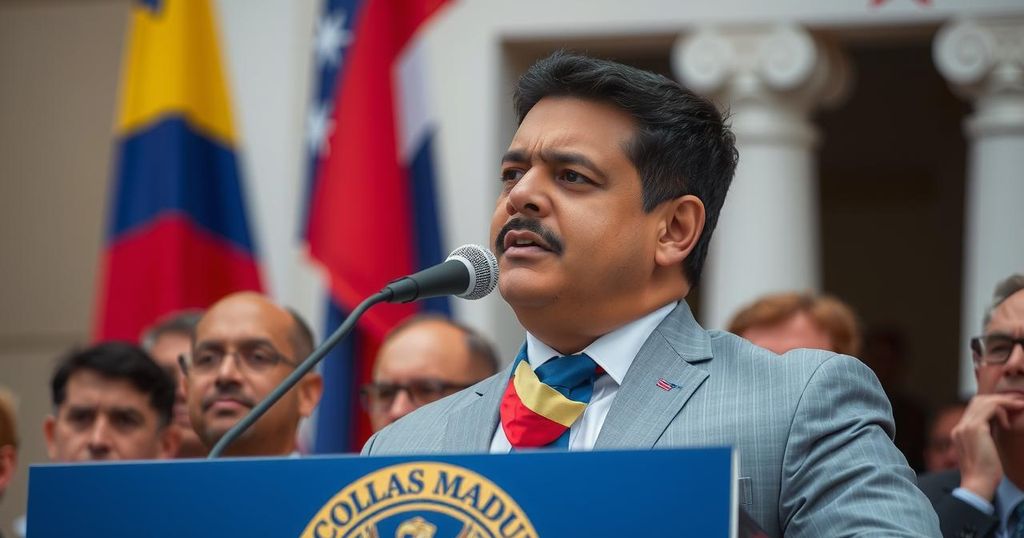Nicolás Maduro Sworn in Amid Protests and Allegations of Election Fraud

Nicolás Maduro was sworn in for a new term as President of Venezuela despite credible allegations of electoral fraud. Protests erupted, with opposition leader María Corina Machado reportedly detained. The legitimacy of Maduro’s election is contested, as opposition tallies suggest a different outcome. International observers supported the opposition’s claims, leading to significant unrest and governmental repression.
In a controversial ceremony, Nicolás Maduro was sworn in as the President of Venezuela, extending his rule until 2031, despite credible allegations regarding the legitimacy of the recent elections. Heavy security marked the occasion at the Venezuelan legislative palace amid ongoing protests from the opposition, who argue that their candidate Edmundo González rightfully secured the presidency through the election process. Reports indicate an alarming state of repression following Maduro’s election, as opposition leaders faced detainment and intimidation.
On the eve of the inauguration, protests erupted in Caracas, where opposition leader María Corina Machado was reportedly detained and pressured to record confessions against the government. Machado, having evaded capture for some time, participated in the protests to advocate for González, who he claims won the electoral contest. As her convoy was violently intercepted by security personnel, international leaders condemned the government’s actions and demanded her release.
Despite strong opposition claims, the Maduro regime continues to uphold its alleged electoral victory, with authorities citing support from electoral bodies without providing transparency in the voting process. Unverified declarations showed Maduro winning; however, the opposition presented independent tallies suggesting that González received double the votes.
International observers, including the U.S.-based Carter Center, corroborated the opposition’s evident success in the elections, leading to widespread protests and greater scrutiny on the regime. The Maduro government responded with violence, resulting in thousands of arrests and various reports of detainee mistreatment. Amidst these tensions, the participation of foreign leaders at the inauguration remained uncertain, with some, like Colombian President Gustavo Petro, opting to abstain in light of recent opposition detentions.
The political landscape in Venezuela has been tumultuous, characterized by allegations of electoral fraud, brutal crackdowns on dissent, and the ongoing legitimacy crisis of Nicolás Maduro’s regime. Maduro’s governance has been marked by increasing repression against opposition figures, culminating in significant unrest following the recent election where allegations surfaced contesting the announced election results. The role of electoral authorities and international observers has further intensified scrutiny on Maduro’s leadership and the validity of his claims to power. The opposition has faced severe constraints, with key leaders barred from running for office, while protests have been met with violent suppression. The circumstances surrounding Maduro’s swearing-in reflect the profound challenges facing Venezuelan democracy and governance, inviting widespread international condemnation and calls for accountability.
The swearing-in of Nicolás Maduro as President of Venezuela amid allegations of electoral fraud underscores the deepening political crisis in the country. This ceremony, marred by protest and repression, highlights the stark divide between the government’s claims and the opposition’s assertions regarding electoral legitimacy. The international community’s reactions signal a growing concern for human rights and democracy in Venezuela, indicating that the struggle for legitimate governance is far from over.
Original Source: wsvn.com








